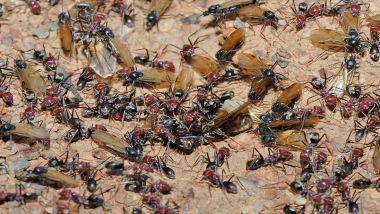A huge cloud of flying ants hit England’s south coast and even the satellites in space could not ignore it. The colony of the insects was so dense that it was at first mistaken for clouds of rain on the weather map. Captured on the Met Office’s radar, the swarm of insects reportedly hit the counties of Hemisphere, West Sussex and Dorset. The viral weather report marks the official arrival of the ant mating season, which usually happens in England, when the weather conditions are perfect for them to romance and the moment is popularly known as Flying Ant Day. Fastest Mover in The Earth is a Tiny Creature Named Dracula Ants! Watch Video of Snapping Jaws at 320 km/h.
After spotting the flying ants, the Met Office, tweeted, “The latest view from space shows that our radar is picking up something that isn't precipitation along the south coast. We know this to be insect clutter (flying ants) based on inspection of raw reflectivity.” They acknowledged that ants appeared on their image as showers of rain because, “the radar thinks the beams are hitting raindrops not ants.” Army Ants Build Bridge to Attack Wasp Nest! Amazing Piece of Engineering Captured in Viral Video.
Watch Video: Cloud of Flying Ants on Weather Maps
Flying ants!!!
Swarms of them flying into the sky in S Eng are being picked up as rain on the radar image this morning...!#flyingantday #flyingants 🐜🐜🐜🐜#yuk pic.twitter.com/QGOcikqJFq
— Simon King (@SimonOKing) July 17, 2019
Swarm of flying ants is spotted in the sky when the weather seems perfect for them to move into their “nuptial flight.” It is a phase of their annual breeding frenzy. Flying ant season arrives every July and August. The swarms we see in the air can be explained as insects travelling together in groups to keep themselves protected. Queens takes the flight, encouraging the males to pursue her and only the strongest can mate with her.
(The above story first appeared on LatestLY on Jul 18, 2019 11:49 AM IST. For more news and updates on politics, world, sports, entertainment and lifestyle, log on to our website latestly.com).













 Quickly
Quickly




















